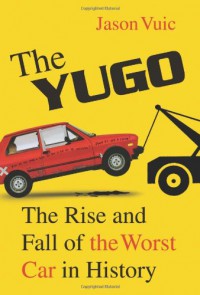The Little Engine that Almost Could

A story is a comedy if it has a happy ending, a tragedy if not. If the plain, cheap, little slow-moving car from Yugoslavia is the hero of this story, it’s a tragedy, because the hero dies in the end. For the hopeful workers at Zastava who cried with joy when the first Yugo destined for America rolled off the assembly line, the demise of their dreams came along with the collapse of their country as well as the struggling car company that imported their product. And yet, there is a lot of comedy in this book, in the near-impossible career of Malcolm Bricklin, the phoenix-like entrepreneur who rose repeatedly from disastrous ventures to raise capital and try again. Without him, we’d never have had Yugos in the U.S.
Was the car as uniquely bad as the Yugo jokes that introduce each chapter made it out to be? Or were there other equally flawed cars on the market that didn’t get the same treatment? One of the things that fascinated me about this book was the impact of mass media pop culture on the little car’s reputation, from initial enthusiastic free publicity to the groundswell of Yugo-bashing. Author Jason Vuic examines the image-conscious eighties through the lens of the Yugo. He also explores the history of Yugoslavia, a short-lived country that came together and fell apart within the same century. Its national karma seems to have transferred to its iconic car. If there had never been Slobodan Milosevic, would we still have Yugos? An academic historian and gifted story-teller, Vuic reveals the world through his chosen piece of material culture.
The interaction of capitalist expectations and American safety and environmental standards with the we-get-paid-anyway drinking-on-the job culture of Zastava made me think about the importance of pride and hope. Workers who were chosen for the Yugo-A assembly line, the production of cars destined for America, were not paid more—Yugoslavia’s socialist way of doing things required that all workers were treated equally—and yet they worked harder, cut out the brandy breaks, and aimed for better quality than ever before, because they had pride in the improvements they were making and hope for Yugo abroad.
The cars still had problems of course, embarrassing ones at times, but they met American standards or they couldn’t have been sold. And sold they were. I like to think there is still one on the road somewhere, lemon-yellow, going zero-to sixty in nineteen seconds, never reaching its maximum speed of eighty mph, doing its no-frills job of getting a person from one place to the next.
 2
2


